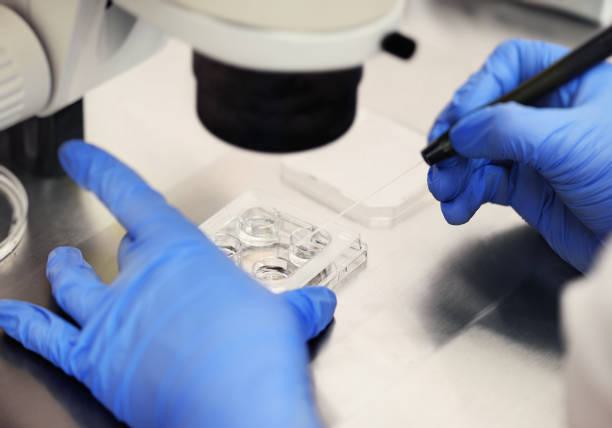MONTGOMERY — State lawmakers filed multiple bills on Tuesday in response to an Alabama Supreme Court ruling that an embryo created through in-vitro fertilization (IVF) is a child protected by Alabama's wrongful death act and the Alabama Constitution.
In a case originating from Mobile, LePage v. Mobile Infirmary Clinic, Inc., the Supreme Court held in a 7-2 decision that parents of frozen embryos killed at an IVF clinic when an intruder tampered with a freezer may proceed with a wrongful death lawsuit against the clinic for alleged negligence.
The Court also held that the Alabama Constitution's Sanctity of Life Amendment, ratified by Alabama voters and made law in 2018, would require the Court to interpret the law in favor of protecting the unborn. Alabama's Sanctity of Life Amendment declares in the state Constitution that it is "the public policy of this state to recognize and support the sanctity of unborn life and the rights of unborn children, including the right to life."
Legislation by State Sen. Tim Melson (R-Florence) and State Rep. Terri Collins (R-Decatur) "would provide civil and criminal immunity to persons providing goods and services related to in vitro fertilization except acts or omission that are intentional and not arising from or related to IVF services." The bills would be retroactive. Melson's bill would sunset on April 1, 2025, and Collins's bill would sunset on June 1, 2025.
"Hopefully we'll open up back IVF clinics and get the process going for these ladies to be successful in their treatment," Melson told reporters Tuesday.
Eric Johnston, president of the Alabama Pro-Life Coalition and author of Alabama's 2019 abortion ban law, told 1819 News on Tuesday the bills stop potential lawsuits until the issue is resolved.
"After the Supreme Court opinion rendered Friday a week ago, the IVF clinics closed down for fear of lawsuits. Lawsuits could be brought under the wrongful death of a minor statute, which was the subject of that Supreme Court case. As you know, the ruling indicated the fertilized egg frozen embryo would be a person under the Alabama Constitutional Amendment protecting the unborn," Johnston said. "The opinion was actually four Justices who agreed the unborn child is protected. One Justice was equivocal, and three others were not in agreement. Therefore, the opinion was not as strong as it could be. Also, it applied only to that wrongful death statute and had no effect on any other laws. That wrongful death of a minor law was passed in 1872. Of course, at that time, the Legislature was not well informed about embryology. However, I think the law would apply to unborn children, including these embryos."
He continued, "At common law, an unborn person had no rights. We amended our criminal code several years ago with the Brody Act, which made it a crime to kill an unborn child implanted in utero. That is the same definition we use in the Alabama Human Life Protection Act. Those are evidentiary-based requirements, so a prosecuting attorney could prove a crime was committed. On the other hand, the embryo is in vitro. It is a whole different question about its protection. The same definitions used in the above-mentioned statutes would not apply.
"The legislature has within its power to pass laws that regulate these types of things. The attached bill is within the power of the Legislature. It does not deal with the personhood argument of the court case but simply stops potential lawsuits until the issue is resolved. Over the last few days, we have worked steadily to come up with solutions. A number of bills were proposed. You will notice in this bill that it has a sunset provision of April 1, 2025.
"The plan is for a committee or commission to be established to review the whole situation and come up with an overall plan to deal with this," Johnston said. "We are in agreement with that because of the complexity of the issue. We will work with the various interests to facilitate IVF with proper regulation. We will be diligent in pursuing the continuation of protection of the unborn."
Similar legislation filed by State Sen. Larry Stutts (R-Tuscumbia) on Tuesday would provide civil and criminal immunity to persons providing services related to in vitro fertilization if the persons are following commonly accepted practices of care.
"It's just a simplified bill that addresses the problem that we've been told we have which is liability," Stutts told 1819 News on Tuesday. "It's just the exact approach that I think we need to take. We don't need to talk about other issues. We don't need to talk about sunsetting. We don't need to talk about retroactive. There's a problem that has apparently been identified and my bill solves it. If you're worried about liability, well we fixed that. Move on. End of discussion. That's all we need to do. The infertility people that are talking about not proceeding with their planned IVF cycles and all that, they say it's a liability issue, so we took the liability issue away (and) now do your job. Very simple and very straightforward. I've been involved in OB-GYN and stuff in my practice for over 30 years and worked with many, many infertility doctors and stuff during that time. If the liability is the issue you're concerned with, this bill fixes that."
Both bills by Melson and Stutts are scheduled to be considered in the Senate Healthcare Committee at noon on Wednesday.
To connect with the author of this story or to comment, email caleb.taylor@1819News.com.
Don't miss out! Subscribe to our newsletter and get our top stories every weekday morning.










